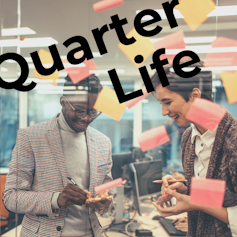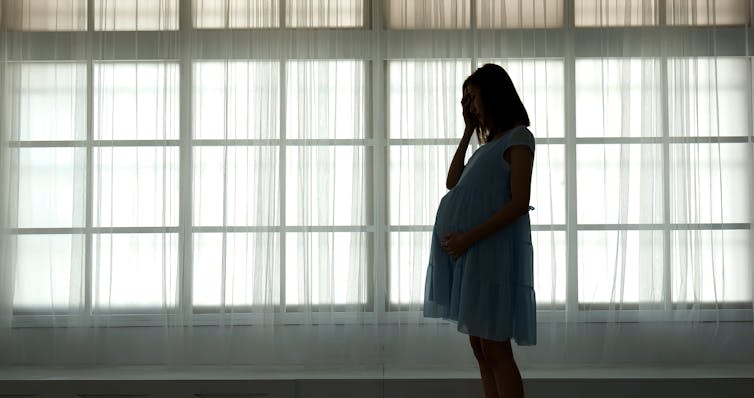Why losing a parent when you’re a young adult is so hard

Losing a parent is never easy. Although the grief of parentally bereaved children and adolescents is widely recognised by charities and in media, people in their twenties and thirties can be overlooked.
If you are in this cohort, you will have transitioned into adulthood, but you may not have acquired the life skills maturity brings, and may still feel very much like your parent’s child. Research shows that many in this age group experience emotional and behavioural issues after losing a parent.
Grief is the price we pay for love. The closer our attachment to the person we lose, the more intense our grief. As we get older, we gradually accept that our parents will not be around forever. If they die young when we are still young, it comes as a shock. Both men and women of any age who remain single and living with either or both parents, often display intense grief on becoming orphaned.

This article is part of Quarter Life, a series about issues affecting those of us in our 20s and 30s. From the challenges of beginning a career and taking care of our mental health, to the excitement of starting a family, adopting a pet or just making friends as an adult. The articles in this series explore the questions and bring answers as we navigate this turbulent period of life.
You may be interested in:
Should I have children? Why society’s idealisation of motherhood benefits no one
Loneliness is a major public health problem – and young people are bearing the brunt of it
What you should know about coming out as LGBTQ+ in your 20s and 30s
Part of growing up involves the parental bond weakening as attachment is transferred to a romantic relationship. We know that the grief for a lost spouse is generally worse than the death of a parent.
The move from home to university can involve losing friendships and romantic relationships as you form new ones. All of this will be harder if you know that back home, your parent is seriously ill or has suddenly died.
Setting off for university, or work away from home, shortly after the death of a parent, comes with its own struggles which requires creative resilience to cope. For example, a young woman whose father died shortly before she went to university managed her grief by writing letters to him in a journal throughout her studies.
Changing circumstances
The cost of living means that many young people live with their parents into their twenties and thirties. Their bond will still be strong and the family unit with mum and dad will be part of everyday life. Should one of them die, certainties and assumptions about support networks and family life are shattered.
Learning to live without a parent can be easier if you have made the break and have set up your own home with a partner and children to love. Though this is not always the case – I have counselled many men and women who have retained a close connection with their parents even when they’ve lived independently from them.
Your gender, role in the family and cultural background may also affect how you grieve the loss of a parent. I have also counselled newly bereaved widows whose eldest sons tried to become the protector, even at an early age. Be they child or adult, sons may postpone their grief until they feel their mother is in a better place.
Unexpressed grief can lead to emotional or even physical complications. I worked with a man in his mid-20s experiencing chronic symptoms mirroring his father’s fatal illness, despite tests which revealed no pathology.
The expectations, rights and responsibilities conferred on the firstborn child can lead to stresses and tensions within the family which exacerbate grief in all its bereaved children. In Hindu society, the oldest son is often chief mourner for each parent’s funeral, and traditionally, becomes the head of the household on his father’s death.
Read more: What is 'eldest daughter syndrome' and how can we fix it?
Lost role models
Sometimes the most trivial things can trigger grief. You’re putting up shelves, or cooking a new recipe, but there is nobody to phone home to get advice when it goes pear-shaped. It’s times like that when you want your mum or dad.
Many young women find that the most difficult experience is when they become pregnant. No parent to go with them to clinic appointments, nobody to advise and support life with a new baby, nor the ongoing child-rearing, no reassuring parent at the end of a phone. Many young mothers who had previously coped with losing their own mother, first come to bereavement counselling when they become mothers themselves.
Sometimes, the transition into adulthood and the weakening of childhood bonds is accompanied by disagreements with parents, at worst, leading to a rupture in the parent-child relationship. I have worked with many adults whose grief has been complicated by guilt at not patching up the relationship before it was too late.

Learning to cope
Each significant person in our life leaves a legacy. What did they teach us about life – purposely or by example? Which of these lessons will we take into our future? What would we do differently?
Photographs and family artefacts can help us form a continuing bond with our parents. Talking with other family members about our ambivalent relationship may heal unresolved wounds.
Whatever your age, remember that grief is an intensely personal experience, and no two people grieve the same.
This article is republished from The Conversation under a Creative Commons license. Read the original article.

John Frederick Wilson does not work for, consult, own shares in or receive funding from any company or organisation that would benefit from this article, and has disclosed no relevant affiliations beyond their academic appointment.

 Yahoo News
Yahoo News 
